初中英语中考各种时态混合训练
- 格式:doc
- 大小:54.50 KB
- 文档页数:3
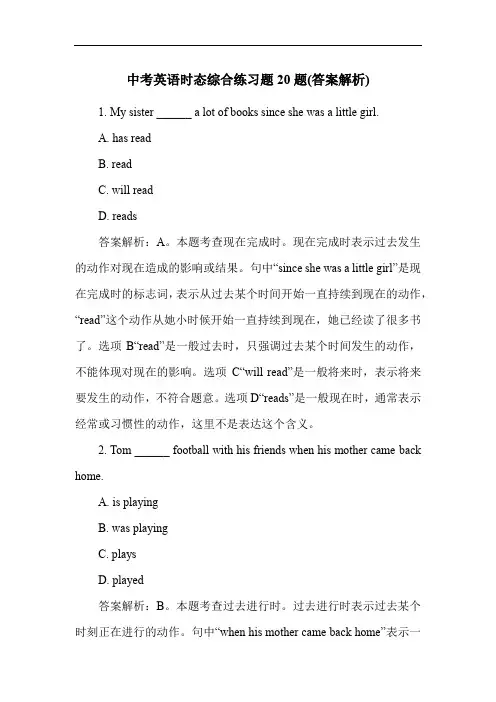
中考英语时态综合练习题20题(答案解析)1. My sister ______ a lot of books since she was a little girl.A. has readB. readC. will readD. reads答案解析:A。
本题考查现在完成时。
现在完成时表示过去发生的动作对现在造成的影响或结果。
句中“since she was a little girl”是现在完成时的标志词,表示从过去某个时间开始一直持续到现在的动作,“read”这个动作从她小时候开始一直持续到现在,她已经读了很多书了。
选项B“read”是一般过去时,只强调过去某个时间发生的动作,不能体现对现在的影响。
选项C“will read”是一般将来时,表示将来要发生的动作,不符合题意。
选项D“reads”是一般现在时,通常表示经常或习惯性的动作,这里不是表达这个含义。
2. Tom ______ football with his friends when his mother came back home.A. is playingB. was playingC. playsD. played答案解析:B。
本题考查过去进行时。
过去进行时表示过去某个时刻正在进行的动作。
句中“when his mother came back home”表示一个过去的时间点,在这个时间点上,Tom正在和他的朋友踢足球,所以用过去进行时。
选项A“is playing”是现在进行时,用于现在正在进行的动作,不符合题意。
选项C“plays”是一般现在时,强调经常或习惯性动作,不适合这里。
选项D“played”是一般过去时,只表示过去发生了某个动作,不能体现当时正在进行的状态。
3. We ______ to the park if it doesn't rain tomorrow.A. goB. wentC. will goD. have gone答案解析:C。
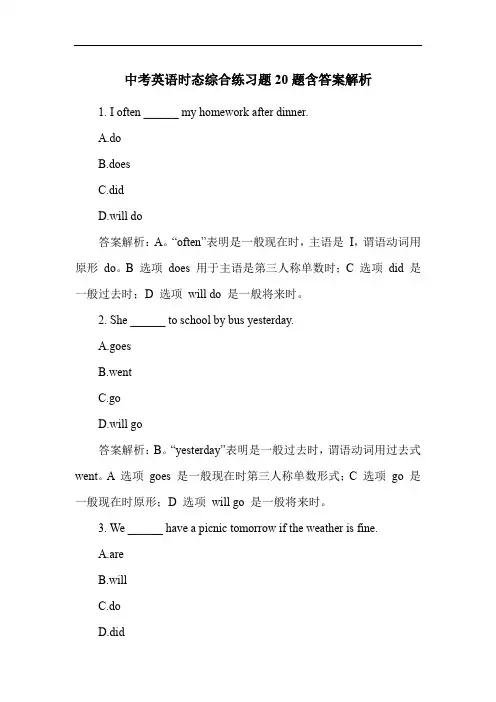
中考英语时态综合练习题20题含答案解析1. I often ______ my homework after dinner.A.doB.doesC.didD.will do答案解析:A。
“often”表明是一般现在时,主语是I,谓语动词用原形do。
B 选项does 用于主语是第三人称单数时;C 选项did 是一般过去时;D 选项will do 是一般将来时。
2. She ______ to school by bus yesterday.A.goesB.wentC.goD.will go答案解析:B。
“yesterday”表明是一般过去时,谓语动词用过去式went。
A 选项goes 是一般现在时第三人称单数形式;C 选项go 是一般现在时原形;D 选项will go 是一般将来时。
3. We ______ have a picnic tomorrow if the weather is fine.A.areB.willC.doD.did答案解析:B。
“tomorrow”表明是一般将来时,用will+动词原形。
A 选项are 后面不能直接跟动词原形have;C 选项do 用于一般现在时;D 选项did 用于一般过去时。
4. My father usually ______ newspapers in the morning.A.readB.readsC.is readingD.will read答案解析:B。
“usually”表明是一般现在时,主语是my father 第三人称单数,谓语动词用reads。
A 选项read 是原形;C 选项is reading 是现在进行时;D 选项will read 是一般将来时。
5. I ______ to the park last Sunday.A.goB.wentC.will goD.am going答案解析:B。
“last Sunday”表明是一般过去时,谓语动词用过去式went。
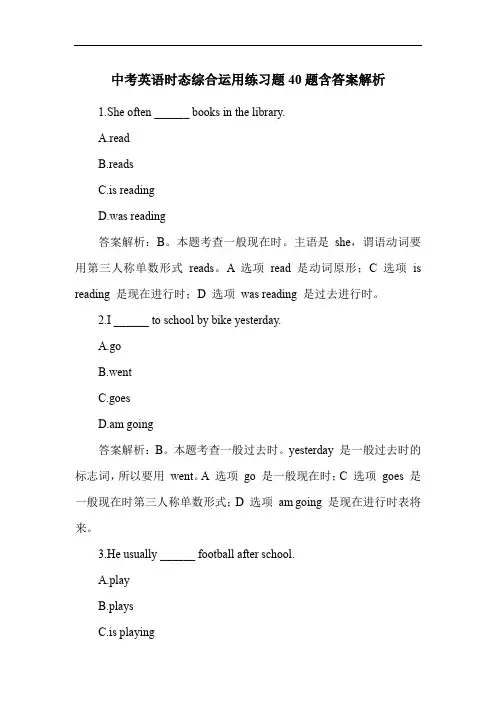
中考英语时态综合运用练习题40题含答案解析1.She often ______ books in the library.A.readB.readsC.is readingD.was reading答案解析:B。
本题考查一般现在时。
主语是she,谓语动词要用第三人称单数形式reads。
A 选项read 是动词原形;C 选项is reading 是现在进行时;D 选项was reading 是过去进行时。
2.I ______ to school by bike yesterday.A.goB.wentC.goesD.am going答案解析:B。
本题考查一般过去时。
yesterday 是一般过去时的标志词,所以要用went。
A 选项go 是一般现在时;C 选项goes 是一般现在时第三人称单数形式;D 选项am going 是现在进行时表将来。
3.He usually ______ football after school.A.playB.playsC.is playingD.played答案解析:B。
本题考查一般现在时。
usually 是一般现在时的标志词,主语是he,谓语动词要用第三人称单数形式plays。
A 选项play 是动词原形;C 选项is playing 是现在进行时;D 选项played 是一般过去时。
4.They ______ a picnic last weekend.A.haveB.hadC.hasD.is having答案解析:B。
本题考查一般过去时。
last weekend 是一般过去时的标志词,所以要用had。
A 选项have 是一般现在时;C 选项has 是一般现在时第三人称单数形式;D 选项is having 是现在进行时。
5.My mother ______ breakfast for me every day.A.makeB.makesC.is makingD.made答案解析:B。
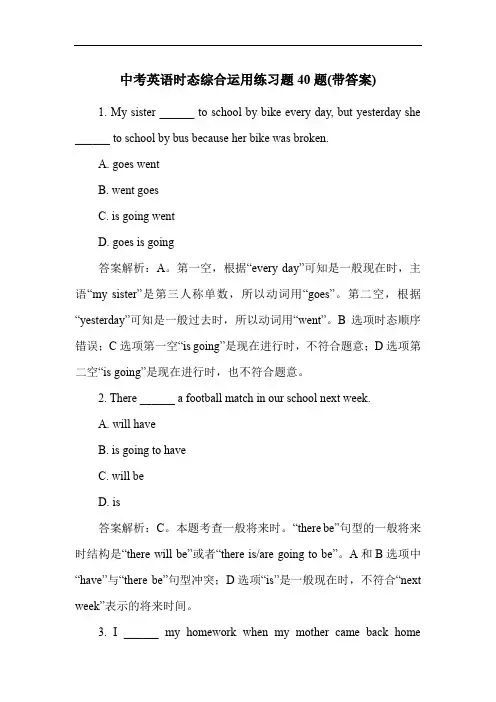
中考英语时态综合运用练习题40题(带答案)1. My sister ______ to school by bike every day, but yesterday she ______ to school by bus because her bike was broken.A. goes wentB. went goesC. is going wentD. goes is going答案解析:A。
第一空,根据“every day”可知是一般现在时,主语“my sister”是第三人称单数,所以动词用“goes”。
第二空,根据“yesterday”可知是一般过去时,所以动词用“went”。
B选项时态顺序错误;C选项第一空“is going”是现在进行时,不符合题意;D选项第二空“is going”是现在进行时,也不符合题意。
2. There ______ a football match in our school next week.A. will haveB. is going to haveC. will beD. is答案解析:C。
本题考查一般将来时。
“there be”句型的一般将来时结构是“there will be”或者“there is/are going to be”。
A和B选项中“have”与“there be”句型冲突;D选项“is”是一般现在时,不符合“next week”表示的将来时间。
3. I ______ my homework when my mother came back homeyesterday.A. doB. was doingC. didD. am doing答案解析:B。
根据“when my mother came back home yesterday”可知,当妈妈昨天回家这个瞬间动作发生时,“我”正在做家庭作业,是过去进行时。
A选项“do”是一般现在时;C选项“did”是一般过去时,不能表达当时正在进行的动作;D选项“am doing”是现在进行时,时间不符。
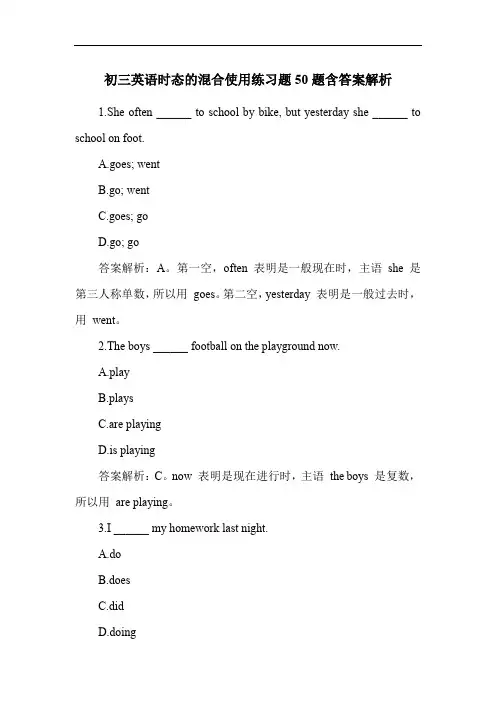
初三英语时态的混合使用练习题50题含答案解析1.She often ______ to school by bike, but yesterday she ______ to school on foot.A.goes; wentB.go; wentC.goes; goD.go; go答案解析:A。
第一空,often 表明是一般现在时,主语she 是第三人称单数,所以用goes。
第二空,yesterday 表明是一般过去时,用went。
2.The boys ______ football on the playground now.A.playB.playsC.are playingD.is playing答案解析:C。
now 表明是现在进行时,主语the boys 是复数,所以用are playing。
3.I ______ my homework last night.A.doB.doesC.didD.doing答案解析:C。
last night 表明是一般过去时,所以用did。
4.My mother usually ______ breakfast for us.A.cookB.cooksC.cookingD.is cooking答案解析:B。
usually 表明是一般现在时,主语my mother 是第三人称单数,所以用cooks。
5.They ______ a picnic last Sunday.A.haveB.hasC.hadD.having答案解析:C。
last Sunday 表明是一般过去时,所以用had。
6.Look! The girls ______ in the classroom.A.singB.singsC.are singingD.is singing答案解析:C。
Look!表明是现在进行时,主语the girls 是复数,所以用are singing。
7.He ______ TV every evening.B.watchesC.watchingD.is watching答案解析:B。
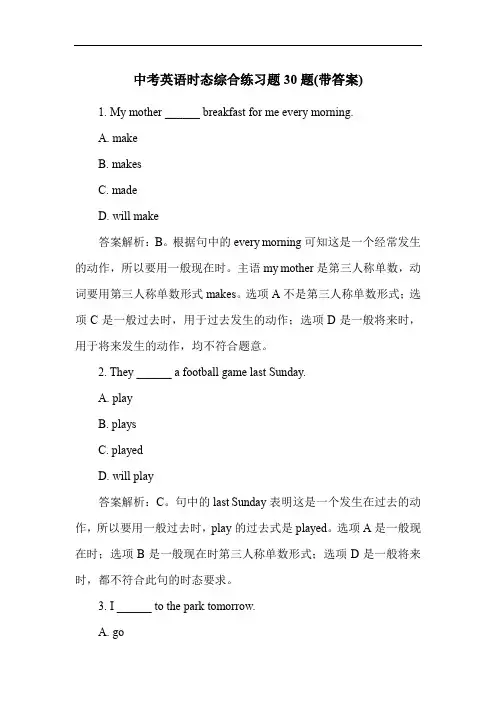
中考英语时态综合练习题30题(带答案)1. My mother ______ breakfast for me every morning.A. makeB. makesC. madeD. will make答案解析:B。
根据句中的every morning可知这是一个经常发生的动作,所以要用一般现在时。
主语my mother是第三人称单数,动词要用第三人称单数形式makes。
选项A不是第三人称单数形式;选项C是一般过去时,用于过去发生的动作;选项D是一般将来时,用于将来发生的动作,均不符合题意。
2. They ______ a football game last Sunday.A. playB. playsC. playedD. will play答案解析:C。
句中的last Sunday表明这是一个发生在过去的动作,所以要用一般过去时,play的过去式是played。
选项A是一般现在时;选项B是一般现在时第三人称单数形式;选项D是一般将来时,都不符合此句的时态要求。
3. I ______ to the park tomorrow.A. goB. wentC. goesD. will go答案解析:D。
句中的tomorrow表示将来的时间,所以要用一般将来时,其结构是will+动词原形,所以答案是will go。
选项A是一般现在时;选项B是一般过去时;选项C是一般现在时第三人称单数形式,均不符合题意。
4. He ______ his homework every day.A. doB. doesC. didD. will do答案解析:B。
every day表示每天,是一般现在时的标志。
主语he是第三人称单数,动词要用第三人称单数形式does。
选项A不是第三人称单数形式;选项C是一般过去时;选项D是一般将来时,不符合要求。
5. She ______ a book yesterday.A. readB. readsC. will readD. is reading答案解析:A。
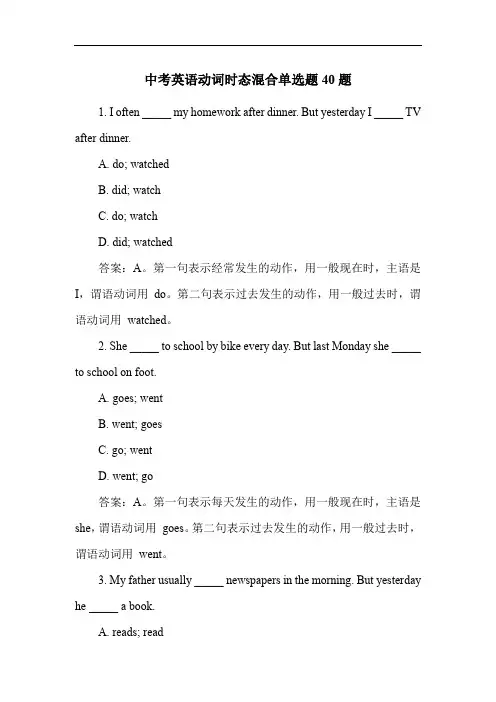
中考英语动词时态混合单选题40题1. I often _____ my homework after dinner. But yesterday I _____ TV after dinner.A. do; watchedB. did; watchC. do; watchD. did; watched答案:A。
第一句表示经常发生的动作,用一般现在时,主语是I,谓语动词用do。
第二句表示过去发生的动作,用一般过去时,谓语动词用watched。
2. She _____ to school by bike every day. But last Monday she _____ to school on foot.A. goes; wentB. went; goesC. go; wentD. went; go答案:A。
第一句表示每天发生的动作,用一般现在时,主语是she,谓语动词用goes。
第二句表示过去发生的动作,用一般过去时,谓语动词用went。
3. My father usually _____ newspapers in the morning. But yesterday he _____ a book.A. reads; readB. read; readsC. read; readedD. reads; reads答案:A。
第一句表示通常发生的动作,用一般现在时,主语是my father,谓语动词用reads。
第二句表示过去发生的动作,read 的过去式还是read。
4. We _____ English classes on Monday and Wednesday. But last week we _____ an English test on Monday.A. have; hadB. had; haveC. have; haveD. had; had答案:A。
第一句表示每周一和周三发生的动作,用一般现在时,主语是we,谓语动词用have。
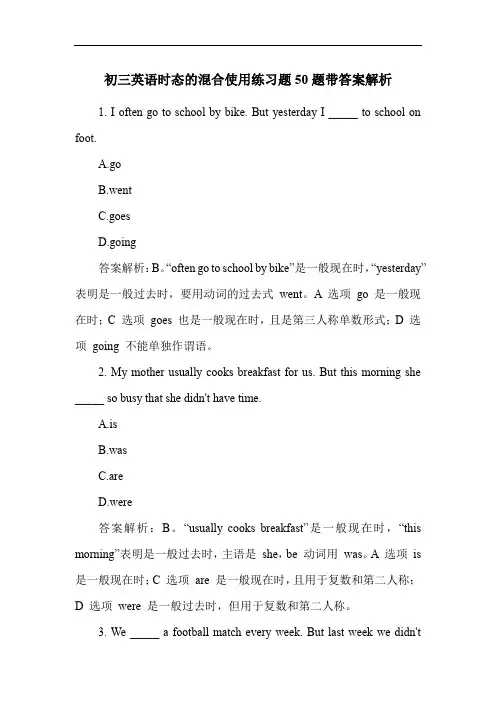
初三英语时态的混合使用练习题50题带答案解析1. I often go to school by bike. But yesterday I _____ to school on foot.A.goB.wentC.goesD.going答案解析:B。
“often go to school by bike”是一般现在时,“yesterday”表明是一般过去时,要用动词的过去式went。
A 选项go 是一般现在时;C 选项goes 也是一般现在时,且是第三人称单数形式;D 选项going 不能单独作谓语。
2. My mother usually cooks breakfast for us. But this morning she _____ so busy that she didn't have time.A.isB.wasC.areD.were答案解析:B。
“usually cooks breakfast”是一般现在时,“this morning”表明是一般过去时,主语是she,be 动词用was。
A 选项is 是一般现在时;C 选项are 是一般现在时,且用于复数和第二人称;D 选项were 是一般过去时,但用于复数和第二人称。
3. We _____ a football match every week. But last week we didn'tbecause of the bad weather.A.haveB.hadC.hasD.having答案解析:A。
“every week”表明是一般现在时,主语是we,用动词原形have。
B 选项had 是一般过去时;C 选项has 是一般现在时,且用于第三人称单数;D 选项having 不能单独作谓语。
4. My father _____ to work by car every day. But yesterday he took the bus.A.goB.wentC.goesD.going答案解析:C。

初三英语时态的混合使用练习题30题1.She often plays basketball after school, but yesterday she ____ football.A.playsB.playedC.is playingD.was playing答案解析:B。
选项A 是一般现在时,不符合“yesterday”这个过去时间状语;选项C 是现在进行时;选项D 是过去进行时,题中没有进行的含义。
“yesterday”表明要用一般过去时,所以选B。
2.We ____ a class meeting now.A.haveB.hadC.are havingD.were having答案解析:C。
“now”表明要用现在进行时,选项A 是一般现在时;选项B 是一般过去时;选项D 是过去进行时。
所以选C。
3.My mother usually cooks dinner at home, but last night my father ____.A.cooksB.cookedC.is cooking答案解析:B。
“last night”表明要用一般过去时,选项A 是一般现在时;选项C 是现在进行时;选项D 是过去进行时。
所以选B。
4.The students ____ in the classroom at the moment.A.studyB.studiedC.are studyingD.were studying答案解析:C。
“at the moment”表明要用现在进行时,选项A 是一般现在时;选项B 是一般过去时;选项D 是过去进行时。
所以选C。
5.I ____ my homework every day, but I didn't do it yesterday.A.doB.didC.am doingD.was doing答案解析:A。
“every day”表明要用一般现在时,选项B 是一般过去时;选项C 是现在进行时;选项D 是过去进行时。
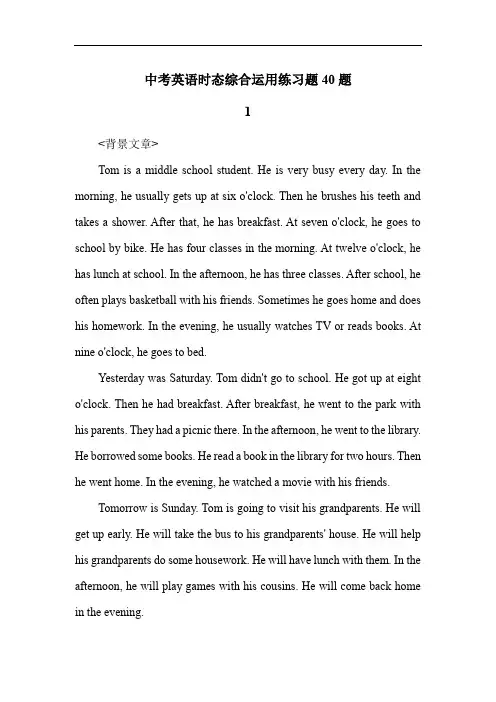
中考英语时态综合运用练习题40题1<背景文章>Tom is a middle school student. He is very busy every day. In the morning, he usually gets up at six o'clock. Then he brushes his teeth and takes a shower. After that, he has breakfast. At seven o'clock, he goes to school by bike. He has four classes in the morning. At twelve o'clock, he has lunch at school. In the afternoon, he has three classes. After school, he often plays basketball with his friends. Sometimes he goes home and does his homework. In the evening, he usually watches TV or reads books. At nine o'clock, he goes to bed.Yesterday was Saturday. Tom didn't go to school. He got up at eight o'clock. Then he had breakfast. After breakfast, he went to the park with his parents. They had a picnic there. In the afternoon, he went to the library. He borrowed some books. He read a book in the library for two hours. Then he went home. In the evening, he watched a movie with his friends.Tomorrow is Sunday. Tom is going to visit his grandparents. He will get up early. He will take the bus to his grandparents' house. He will help his grandparents do some housework. He will have lunch with them. In the afternoon, he will play games with his cousins. He will come back home in the evening.1. Tom usually gets up at six o'clock in the ___.A. eveningB. morningC. afternoonD. night答案:B。
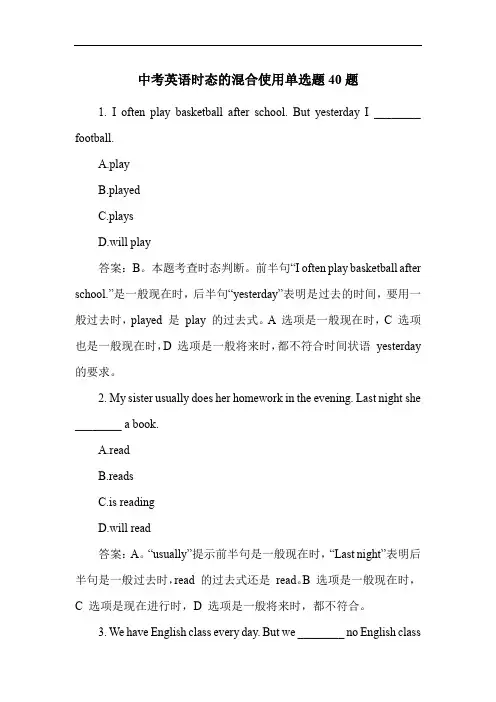
中考英语时态的混合使用单选题40题1. I often play basketball after school. But yesterday I ________ football.A.playB.playedC.playsD.will play答案:B。
本题考查时态判断。
前半句“I often play basketball after school.”是一般现在时,后半句“yesterday”表明是过去的时间,要用一般过去时,played 是play 的过去式。
A 选项是一般现在时,C 选项也是一般现在时,D 选项是一般将来时,都不符合时间状语yesterday 的要求。
2. My sister usually does her homework in the evening. Last night she ________ a book.A.readB.readsC.is readingD.will read答案:A。
“usually”提示前半句是一般现在时,“Last night”表明后半句是一般过去时,read 的过去式还是read。
B 选项是一般现在时,C 选项是现在进行时,D 选项是一般将来时,都不符合。
3. We have English class every day. But we ________ no English classyesterday because our teacher was ill.A.haveB.hadC.will haveD.are having答案:B。
“every day”说明前半句是一般现在时,“yesterday”提示后半句是一般过去时,had 是have 的过去式。
A 选项是一般现在时,C 选项是一般将来时,D 选项是现在进行时,都不对。
4. My mother cooks dinner every day. She ________ noodles yesterday.A.cookB.cooksC.cookedD.will cook答案:C。
中考英语时态综合练习题50题(带答案)1. My mother often ______ delicious cakes for me on Sundays.A. makeB. makesC. madeD. will make答案解析:B。
在这个句子中,“often”是一般现在时的标志词,表示经常发生的动作。
句子描述的是妈妈经常在周日给我做美味的蛋糕这个习惯性动作,所以要用一般现在时。
主语“my mother”是第三人称单数,动词要用第三人称单数形式“makes”。
选项A“make”是动词原形,不能用于第三人称单数主语;选项C“made”是一般过去时,不符合句子描述的经常发生的情况;选项D“will make”是一般将来时,也不符合句子语境。
2. Tom ______ football every weekend.A. playB. playsC. playedD. is playing答案解析:B。
“every weekend”表明这是一个经常发生的动作,要用一般现在时。
主语“Tom”是第三人称单数,所以动词要用“plays”。
选项A“play”是动词原形,不适用于第三人称单数主语;选项C“played”是一般过去时,不符合句子表达的每个周末都做的意思;选项D“isplaying”是现在进行时,这里不是正在进行的动作。
3. The sun ______ in the east and sets in the west.A. riseB. risesC. roseD. has risen答案解析:B。
这是一个客观事实,太阳从东边升起西边落下,客观事实要用一般现在时。
主语“the sun”是第三人称单数,动词用“rises”。
选项A“rise”是动词原形;选项C“rose”是一般过去时;选项D“has risen”是现在完成时,都不符合客观事实用一般现在时的要求。
4. She ______ to school by bike every day.A. goB. goesC. wentD. will go答案解析:B。
中考英语时态综合练习题30题1. My mother ____ breakfast for me every morning.A. makeB. makesC. madeD. will make答案:B。
本题考查一般现在时。
根据“every morning”这个时间状语可知,这是一个经常发生的动作,要用一般现在时。
主语“my mother”是第三人称单数,所以动词要用第三人称单数形式“makes”。
选项A“make”不是第三人称单数形式,不符合语法规则;选项C“made”是一般过去时,表示过去发生的动作,与题意不符;选项D“will make”是一般将来时,表示将来要发生的动作,也不符合题意。
2. We ____ a great time at the park last Sunday.A. haveB. hadC. will haveD. are having答案:B。
本题考查一般过去时。
“last Sunday”是一个明确的过去时间状语,表明动作发生在过去,所以要用一般过去时。
动词“have”的过去式是“had”,所以答案是B。
选项A“have”是一般现在时,不符合时间要求;选项C“will have”是一般将来时,用于将来发生的动作;选项D“are having”是现在进行时,表示正在进行的动作,均不符合题意。
3. Tom ____ to Beijing next week.A. goesB. wentC. will goD. has gone答案:C。
本题考查一般将来时。
“next week”表示将来的时间,所以句子要用一般将来时。
一般将来时的结构是“will+动词原形”,所以答案是C。
选项A“goes”是一般现在时的第三人称单数形式,不符合题意;选项B“went”是一般过去时,不能用于表示将来的动作;选项D“has gone”是现在完成时,表示过去发生的动作对现在造成的影响,也不符合题意。
初三英语时态的混合使用练习题50题(带答案)1. Look! The students ______ (play) basketball on the playground. They usually ______ (play) basketball after class.A. play; are playingB. are playing; playC. are playing; are playingD. play; play答案解析:B。
第一空根据“Look!”这个提示词,可以判断出这里是正在进行的动作,所以要用现在进行时,即“are playing”;第二空“usually”表示通常的情况,是一般现在时的标志词,所以要用“play”。
A选项时态使用错误;C选项第二空时态错误;D选项第一空时态错误。
2. In class, our teacher ______ (explain) the grammar rules while some students ______ (not listen).A. is explaining; don't listenB. explains; aren't listeningC. is explaining; aren't listeningD. explains; don't listen答案解析:C。
“while”表示当一个动作正在进行的时候,另一个动作也在同时进行,所以这里都要用进行时。
“our teacher”是单数第三人称,be动词用“is”,“students”是复数,be动词用“are”,否定形式为“aren't”。
A选项第二空时态错误;B选项第一空时态错误;D选项两空时态都错误。
3. Every day, the bell ______ (ring) at eight o'clock, but now it ______ (not ring) because it is broken.A. rings; isn't ringingB. is ringing; doesn't ringC. rings; doesn't ringD. is ringing; isn't ringing答案解析:A。
初中英语时态混合练习题100题(答案解析)1. I often play basketball after school. But yesterday I _____ football.A.playB.playedC.playsD.will play答案解析:B。
第一句“I often play basketball after school.”是一般现在时,表示经常发生的动作。
第二句“But yesterday”表明是过去的时间,要用一般过去时,play 的过去式是played。
2. She _____ her homework every day. But she _____ it late last night.A.does;didB.do;didC.does;doesD.did;does答案解析:A。
第一句“every day”表明是一般现在时,主语是she,谓语动词用does。
第二句“last night”是过去的时间,用一般过去时,do 的过去式是did。
3. We _____ to school by bus every morning. But this morning we _____ on foot.A.go;wentB.goes;wentC.went;goD.will go;go答案解析:A。
第一句“every morning”是一般现在时,主语是we,谓语动词用go。
第二句“this morning”是过去的时间,用一般过去时,go 的过去式是went。
4. My brother _____ TV after dinner. But he _____ books yesterday evening.A.watches;readB.watch;readsC.watches;readsD.watched;read答案解析:A。
第一句“My brother”是第三人称单数,“after dinner”表明是一般现在时,谓语动词用watches。
大班缤纷夏日活动教案设计教案标题:大班缤纷夏日活动教案设计教学目标:1. 帮助幼儿了解夏季的特点和常见的活动。
2. 提供丰富的夏日体验和创造性的活动,发展幼儿的感知和动手能力。
3. 培养幼儿的合作意识和团队合作能力。
4. 促进幼儿的想象力和创造力发展。
教学内容:1. 夏季的特点和活动:例如阳光明媚、天气炎热、去海滩、吃冰淇淋等。
2. 夏日体验活动:例如玩水游戏、制作冰淇淋、观察昆虫等。
3. 创造性的夏日活动:例如制作太阳帽、绘制海洋生物、玩沙子等。
教学步骤:前期准备:1. 收集有关夏季的图片、玩具和实物,用于教学展示。
2. 准备夏日活动所需要的材料,如水枪、彩色纸张、沙子等。
3. 确保教室或活动场地的安全性和适应性。
引入活动:1. 引导幼儿观察夏季的特点,例如阳光明媚、天气炎热等。
展示相关图片,激发幼儿的兴趣。
2. 鼓励幼儿分享自己喜欢的夏日活动,如去游泳、做冰淇淋等。
主体活动:1. 夏日体验活动:a. 水枪游戏:在室外设置游戏场地,幼儿分组使用水枪进行游戏,增强幼儿的合作和团队意识。
b. 制作冰淇淋:教导幼儿用果汁、冰棍和小杯子制作自己的冰淇淋,培养他们的动手能力和想象力。
c. 观察昆虫:带领幼儿到校园花园或室外,观察昆虫的活动,引导他们发现不同种类的昆虫。
2. 创造性的夏日活动:a. 制作太阳帽:幼儿使用彩色纸张、剪刀和胶水制作自己的太阳帽,激发幼儿的创造力和想象力。
b. 绘制海洋生物:提供海洋生物的图片供幼儿参考,引导他们使用彩色纸张和颜料绘制自己喜欢的海洋生物。
c. 玩沙子:在室外设置沙盘,为幼儿提供挖沙、建筑城堡等活动,鼓励他们发挥想象力和动手能力。
总结:1. 组织幼儿分享参与活动的体验和感受,引导他们表达对夏日活动的喜爱和认识。
2. 回顾本次活动的主要内容和教学目标,强调夏季活动的乐趣和益处。
扩展活动:1. 鼓励幼儿与家庭成员一起进行夏日活动,例如一起去海滩、户外野餐等。
2. 继续利用夏季的特点和活动进行其他主题活动设计,如夏季水果的制作、夏日阳光和防晒知识等。
初三英语时态的混合使用练习题30题1. My sister ______ (like) reading books. She often goes to the library. But now she ______ (play) basketball with her friends.A. likes; is playingB. like; playsC. liked; playedD. is liking; is playing答案:A。
解析:第一空,根据“She often goes to the library”可知这是一般现在时描述经常的行为,主语“my sister”是第三人称单数,所以动词用“likes”。
B选项“like”没有用第三人称单数形式,C选项“liked”是一般过去时,不符合语境;D选项“is liking”这种形式是错误的,like一般不用进行时表示喜欢这个动作。
第二空,“now”表明是现在正在进行的动作,要用现在进行时“is playing”,C选项“played”是一般过去时,不符合现在正在进行的语境,B选项“plays”是一般现在时,不能表示正在进行的动作。
2. We ______ (have) a big party this weekend. My mother ______ (prepare) the food for it these days.A. will have; is preparingB. have; preparesC. had; preparedD. are having; prepared答案:A。
解析:第一空,“this weekend”表示将来的时间,所以要用一般将来时“will have”或者“be going to have”等形式,B选项“have”是一般现在时,C选项“had”是一般过去时,都不符合将来的时间概念;D选项“are having”虽然可以表示将来,但更多表示计划好即将发生的事情,这里用“will have”更合适。
初中英语各种时态混合训练1. _______ you _________ (mind) my turning off the radio?2. She ____________ (not do) well in chemistry.3. There ___________ (be) a map and some pictures on the desk.4. Who __________ (own) such a tall building? Mr. King does.5. Don’t worry! It __________ (take) us half an hour to fix the machine.6. We __________ (call) you as soon as he _________ (come) back.7. -- Can your father drive?-- Yes, and he usually _________ (drive) us to school.8. There ________ (be) thousands of volunteers serving in Beijing in August 2008.9. I _____________ (not travel) to Cape Town, so I know nothing about it.10. The boys and girls ______________ (argue) when the UFO landed in front ofthe Flight Museum.11. -- Our team ____________ (win) the match. We’r e got the first place!-- Well done! Congratulations!12.After discussing, the students _________ (come) up with some good ideas towork on the project.13. I find time _________ (go) by very quickly when I do something interesting.14. My brother often ________ (let) me ___________ (wash) clothes for him.15. He says he ___________ (show) us around his factory in two days.16. She _____________ (be) in the city for a long time.17. I learned she ____________ (be) in the city for a long time.18. We visited the Great Wall last term. We __ never___ (be) there before.19. He told me that he ____________ (see) the film three times.20. The train __________ (leave) when we got to the station.21. Before Mr. White went to Paris, he ______ (teach) French for two years.22. As the last train ____________ (leave), we had to stay here for the night .23. The teacher said that she _____________ (take) us to the park the next day.24. His father has gone to Shanghai. He said that he _______ (be) back in a week .25. I heard that she ___ (visit) her grandparents if she was free the next weekend.26. Don’t ________ (turn) off the light, I ___________ (read) the newspaper.27. --How _______ your father _______ (go) to work every day?--He ________ (go) by bike. But it’s cold today. He ___________ (take) the No.21 bus to work instead of riding his bike. And I know he __________ (go) to work by taxi yesterday.28. --What _______ your father usually ________ (do) after lunch?--Sometimes he ____ (read) a comic book, sometimes he ___ (take) a nap.--What _______ he _______ (do) today?--He _________ (clean) the kitchen for my grandma.Look! He_________(clean) over there.29. --________ you ___________ (collect) stamps for a long time?--Yes, I _________.--________ your friend Andy __________ (do) it since he was five?--No, he ________. He ______(start) collecting when he _______ (be) six.30. --________ you _________(watch) the American TV series “Lost” yesterday?--No, I _________. I _______ (do) my homework when the play began.But I ___ (download) it from the Internet and watch it at home this weekend.31. He _______ (get) angry because he ___________ (wait) for a long time.二。
选择题1. --Look at the sign. It’s dangerous to swim here. (2010山东菏泽)--Oh, I _______ notice it. Thanks for telling me.A. haven’tB. won’tC. don’tD. didn’t( ) 2. --Kelly, how long ______ you _______ in this school? (2010·建福州)--For three years. I’ll graduate in July.A. have; studiedB. do; studyC. are; studyingD. will; study( ) 3. --Alice, please tell Eric to call me when he _______ back2010山东莱芜)--No problem. A. come B. comes C. came D. will come( ) 4. ______ a big party in our school in two weeks. 2010山东莱芜)A. It isB. It will beC. There wasD. There is going to be( ) 5. --Shall we go out for a walk?--Sorry, I can’t. I _______ my homework.(2010山东菏泽)A. doB. didC. am doingD. was doing( ) 6. My friend Li Xiao knows my hometown very well because he ______ there many times with me. (2010山东菏泽)A. has been B. has gone C. had gone D. went ( ) 7. Great changes have taken place since we _______ E-Times. And the computer is widely used throughout the world. (2010黑龙江哈尔滨)A. enteredB. will enterC. have enteredD. are entering( ) 8. --Jack is busy packing luggage.(行李)( 2010贵州铜仁)--Yes. He ______ for America on vacation.A. leavesB. leftC. is leavingD. has been away( ) 9. --Hello! Is that Mr. Yang? ( 2010贵州铜仁)--No, he _______ Paris. He will be back in more than two weeks.A. goesB. wentC. has gone toD. has been to( ) 10. --Would you like to see the film Confucius with me this evening--I’d love to, but I _________ it .(2010湖北黄石)A. had seenB. have seenC. watchD. am watching( ) 11. --I _______ the Great Wall next week . 2010湖北襄樊)--Have a good trip! A. visit B. visited C. am visiting D. have visited( ) 12. --I went to see you yesterday evening. But you weren’t in. Where wereyou then? (2010湖北襄樊)--I _______ a walk by the lake with my husband .A. was havingB. am havingC. have hadD. have( ) 13. --How’s the weather tomorrow, Rose? (2010黑龙江鸡西)--I hear there is going to ______ a snow storm.A. haveB. beC. isD. are( ) 14. --Have you ever ______ Xingkai Lake? (2010黑龙江鸡西)--Yes. I ______ there last month. It’s quit e beautiful.A. gone to; wentB. been to; wentC. been to; goD. gone to; go( ) 15. --What’s your father doing now?--He ______ the room.(2010北京)A. cleanedB. cleansC. has cleanedD. is cleaning( ) 16. Tom will call me as soon as he ______ home. (2010北京)A. getsB. has gotC. gotD. will get( ) 17. Rose came to Beijing in 2002. she ______ here for eight years. (2010北京)A. was livingB. liveC. will liveD. has lived。